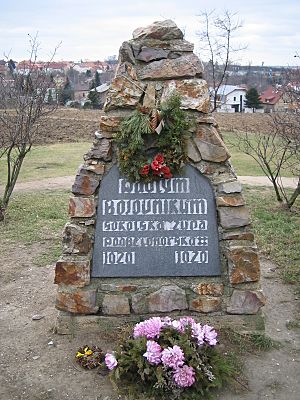Battle of White Mountain facts for kids
The Battle of White Mountain was a very important fight that happened in 1620. It was the first major battle of a long conflict called the Thirty Years' War. In this battle, Duke Maximilian I of Bavaria led an army that defeated the forces of Frederick V. Frederick V was the Elector Palatine and also the King of Bohemia and Moravia.
Contents
Why the Battle Happened
The main reason for the Battle of White Mountain was a revolt by some Czech lords. These lords were unhappy with the way things were going in their country. In 1618, they threw two governors and a secretary out of a window at Prague Castle. This famous event is known as the Defenestration of Prague.
After this incident, the Czech lords quickly gathered an army. They wanted to create an independent country where Protestant beliefs were allowed. Their army grew to about 30,000 soldiers.
The Battle Itself
The Czech army faced a well-trained Imperial army. The Imperial army was much stronger and better prepared. The actual battle was very quick, lasting less than one hour. The Czech forces were completely defeated by the Imperial army.
What Happened After the Battle
After the victory, Emperor Ferdinand II took over as King of Bohemia. He replaced Frederick V. Ferdinand II then punished many people who had opposed him. Some were killed, while others were given a difficult choice. They had to either change their religion to Catholicism or leave the country. This battle had a big impact on the history of Bohemia and the rest of Europe.
White Mountain Today
Today, the area known as White Mountain is part of the city of Prague. There is an open space there, and a monument stands to remember the battle.
Images for kids
-
This painting by Anton Stevens celebrates the Catholic victory. In the top part, you can see Our Lady of Victory surrounded by saints. In the bottom left, there is the victorious Emperor Ferdinand II with his son Ferdinand III and the Bohemian lion.
See also
 In Spanish: Batalla de la Montaña Blanca para niños
In Spanish: Batalla de la Montaña Blanca para niños
 | Bessie Coleman |
 | Spann Watson |
 | Jill E. Brown |
 | Sherman W. White |




